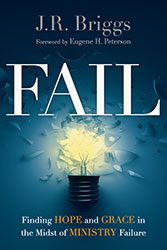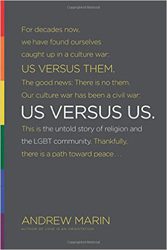 Book Review: Fail: Finding Hope and Grace in the Midst of Ministry Failure, by J.R. Briggs
Book Review: Fail: Finding Hope and Grace in the Midst of Ministry Failure, by J.R. Briggs
The phrase “too big to fail” emerged during the banking crisis of 2008. Banks were bailed out, despite the fact that their own greed led to the economic collapse that threatened the livelihood of millions of Americans, depleted retirement accounts, and spiked home foreclosures. While the TARP or government bailout may have been necessary to avert a second Great Depression, those who perpetrated the crisis were never given – or took – the opportunity to repent of their greed and mismanagement. In fact, many of those who caused the crisis benefitted as a result of the crisis and bailout. We are seeing at the moment the results of a failed war in Iraq, based on inaccurate and deceptive information about weapons of mass destruction, and many of those who initiated this war self-righteously pummel the current administration, and fail to acknowledge that their own misinformation and miscalculations led to the crisis to begin with. Once again, they are too proud and big to fail. Instead of apology and repentance, they shout louder about the rightness of their cause. Repentance appears to be an anathema in both business and governmental policy. This same inability to acknowledge failure and repent can also characterize the ministry.
In this honest book on the challenges of ministry, J.R. Briggs reflects on his own failures and the failures of countless colleagues in ministry, who begin with a sense of call and high hopes for congregational transformation in serving God and end up as discouraged, dispirited, and disappointed in God and their ministries. Ministry can be a thankless profession, and ministers are often seduced by the desire to succeed and the rugged individualism characteristic of the American ethos. They believe that they can make it alone, and save themselves on their own, when healing comes through recognizing the reality of interdependence and the movements of providence whose grace is always sufficient.
Paul’s admonition that in our weakness, we are strong, and that God’s power is made perfect in weakness is not a counsel to passivity, but an invitation to a different kind of agency, grounded in a dynamic relationship with God, whose vision for our ministries takes us as we are and then invites us to go through the valley of failure and grief with hope for the future. According to the philosopher Alfred North Whitehead, God’s vision is always the best for that particular moment in all its ambiguity and possibility. The best possibility may not always be grand; but it is true to our life condition. Even in what we perceive as failure, God presents us with a vision of possibilities that draw us beyond individualism and isolation to interdependence and community.
After many years as a seminary professor and administrator, I have returned to full-time congregational ministry. My congregation on Cape Cod is midsized, struggles with finances, and deals with the limitations of any midsized congregation. We are growing, but our growth is fragile and we must contend with an aging demographic in our church and community at large. It is easy to succumb to a sense of failure when only a handful show up to a program or we continue with a budget deficit despite growing attendance in Sunday and weekday activities. Yet, our success or failure can never fully be judged from the outside or even by ourselves as pastors.
Hope and grace come from the interplay of realism and a deeper, spirit-based realism. This is at the heart of the biblical tradition. In and of itself, a mustard seed can’t yield much, but with divine energy, it gives shelter and shade. Five loaves and two fish can only feed a few, but placed in God’s care, a multitude finds nourishment. The cross represents the fullest embodiment of failure, as Jesus’ ministry comes to nothing on Calvary; yet, within the cross are the seeds of resurrection and a world-transforming movement. Surely, Jesus’ disciples had to face their failure and cowardice as a prelude for embracing their vocation as leaders of the Jesus movement. No doubt they felt grief not only on Good Friday and Holy Saturday, but as they remembered their betrayal of their teacher and savior. They could have projected that failure solely on Judas, but in reality each one had to answer “it is I” who chose security and safety over fidelity. Grace alone can transform us; the graceful providence that allows us to begin, recognize what is in and beyond our power; and open ourselves to power present in sharing our journey with others.
J.R. Briggs doesn’t provide a “how to” or “cookie cutter” spirituality book for everyone; nor does he describe a foolproof way to bring success out of failure. He simply invites us to begin with by being “honest to God” and honest with ourselves. The practices of healing in the midst of failure are tried and true, and though not original, they are life-transforming. They remind us that “it takes a village” to find healing after failure; it also “takes a village” to maintain healthy ministry in the midst of both success and failure. This is good news! As a pastor, I need to open to God’s good news embodied in “my village” and trust God’s grace to guide me in failure and success alike.
Read an author interview — and an excerpt from — Fail at the Patheos Book Club here.
















